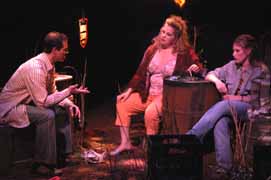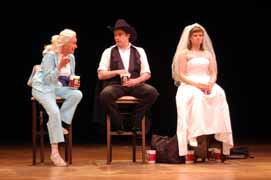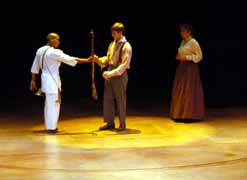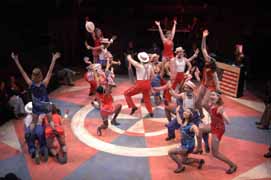
Loney's Show Notes
By Glenn Loney, April 10, 2005

|
|
|
Caricature of Glenn Loney by Sam Norkin. |
|
Please click on "
* " to skip to each subject in this index:
2005 HUMANA FESTIVAL OF NEW
AMERICAN PLAYS: *
THE HUMANA TEN-MINUTE PLAYS: *
ATCA/STEINBERG 2005 NEW PLAY AWARD: *
2005 HUMANA FESTIVAL OF NEW AMERICAN PLAYS:
This spring season—from February to April—Actors Theatre Louisville presented the 29th Annual Humana Festival with several outstanding new American plays. In recent years, if there was only one really effective drama, reviewers— on the special weekend when all of the new plays are shown in a hectic three-day cycle—could count themselves fortunate.
Last season, Humana 2004, the one outstanding play was Gina Gionfriddo’s After Ashley. As with the previous year’s best drama, Omnium Gatherum, Gionfriddo’s Ashley has been produced in Manhattan. Unfortunately, the casting, staging, and design of the production at the Vineyard Theatre really work against the powers of the play—as outlined in the previous Show Notes.
It is to be hoped that regional theatres will not be put off by the largely negative New York reviews of After Ashley, as the problems are not with the play, but with the production. It is a powerful play, dealing in a very personal way with the crisis of hype and media mendacity that menaces the American heart and soul. "Tasteful reconstructions of rape and murder," indeed!
The American Theatre Critics Association obviously admires this drama, for it was awarded a Citation and a $5,000 prize at the Humana on April 2! [Disclosure: Although I am not on the play-reading committee, I am on the board of the ATCA Foundation which funds the award, along with the Harold & Miriam Steinberg Charitable Trust.]
Surely, in Seattle, Denver, Chicago, or Houston, there is a regional ensemble that will have the insight and intelligence to put the power of this play vibrantly on stage. That is also to be hoped for at least three of the new American plays noted below! Of course they should be seen in New York, but not mangled nor misunderstood…
Carlyle Brown’s PURE CONFIDENCE [*****]
 |
| "Pure Confidence" by Carlyle Brown. (l-r)Gavin Lawrence, William McNulty. Photo by Harlan Taylor. |
Before the War Between the States, Southern Gentlemen who raced their own thoroughbreds depended on black jockeys for their triumphs. Although these often amazing athletes were nominally slaves, some of them developed a kind of confidence that enabled them to speak their minds—at least about their own and their opponents’ mounts.
Carlyle Brown’s Simon Cato—wonderfully played by Gavin Lawrence—is the epitome of these jockeys. He wins again and again for the flamboyant Colonel Wiley "The Fox" Johnson. And he talks to the colonel—and his losing rival, the self-important Dewitt—with a saucy frankness that leads to a challenge to Johnson [William McNulty] to meet Dewitt [Larry John Myers] on the Field of Honor.
But Cato isn’t even Johnson’s slave: he’s been hired out for the season at a rigged auction. He wants the colonel to buy him, believing he can earn enough from racing victories to buy his freedom. He realizes Johnson is fond of him, but not as an equal. The colonel’s insightful wife Mattie [Jane Welch] also values Cato, as she does her black maid, Caroline [Kelly Taffe].
Johnson takes Cato and his best horse out on a winning tour of races. But north of the Mason-Dixon Line, they find out that white jockeys rule the races, and they don’t play fair.
In the wake of the Civil War, however, everything changes. Cato had joined the Union Army, seen as a betrayal by the Colonel. Freed, he’s almost worse off than as a race-winning slave-jockey. He is now a deliberately humiliated bellhop at a Saratoga Hotel, where once he raced a thoroughbred.
Now married to Caroline, he is struggling to survive. Now a free woman, she has to slave for white folks as never before when she really was a slave—but Mattie’s confidante and best-friend.
Andy Prosky, as a New York newspaperman, brings them together in Saratoga—where free black Americans, as well as Jews, are not allowed in the hotels.
This taut, charming, exciting, intriguing, ingeniously-structured drama seems an immediate candidate not only for New York, but for stages across the nation. It has been very effectively staged by Clinton Turner Davis in Paul Owen’s brilliantly devised mechanized settings.
That the play is so effective and engrossing—without even so much as a picture of a horse—is a testimony to Brown’s skill as a playwright. But this script would make an even better film, complete with thoroughbreds and even a race at Louisville’s famous Kentucky Derby track, Churchill Downs!
Agent Contact:
Bruce Ostler, Bret Adams Ltd, 448 W 44, NYC 10036/212-765-5630.
Kia Corthron’s MOOT THE MESSENGER [*****]
 |
| "Moot the Messenger" by Kia Corthon. (l-r) Tamilla Woodard, Emily Hyberger, Anna Bullard. Photo by Harlan Taylor. |
This is an amazingly exciting, involving drama and a powerfully provocative critique of the cowardly role of the American Media in covering our disastrous War in Iraq. If Tim Robbins was the first to attempt a dramatic indictment of both the Bush Government and the Complicit Media with his Embedded, Kia Corthron now goes all the way!
Tamilla Woodard is dynamic and fascinating as Briar, an embedded African-American woman journalist who wants to report the war and its aftermath on the ground in Iraq as it really is. And she is connected to Our Troops on a very personal level, for a poor white redneck girl she knew back home is central to the Abu Ghraib prisoner-abuse scandal. And her own brother loses his legs in an ambush…
With this more intimate focus, Corthron emphasizes the devastating sacrifices and mistakes that are daily being made by some of America’s poorest and least-educated young men and women—most of them ill-prepared or trained for what they have been dishonestly ordered to do.
Disgusted and horrified with what she sees in Iraq—but which her stateside bosses really do not want reported—Briar recalls the powerful anti-war protests spurred on by photos of the actual American actions in Vietnam, especially involving civilians. If only American TV audiences could see what’s on BBC. Or even more powerful, what is shown on that infamous Arab Al-Jazeera channel…
The last thing her bosses back home in the Head Office want are feeds from Arab television. After all, if we do not want to know about innocent Iraqui women and children killed in the line of fire, we certainly do not want to see live footage of a family strafed in their car.
Briar’s fighting Jewish Liberal chief [Bob Ari] has fiercely supported Briar’s courageous and truthful reporting. But his bosses have made it very clear that they don’t want such images or reportage. Briar sneaks some shots into prime-time, and her job is gone. As well as that of the also courageous African-American woman TV news supervisor, strongly played by Brenda Thomas.
After all, we do not want photos of all those flag-draped coffins of Our Dead Heroes at Dover Airbase on the front-pages, so why would Media Editors want to antagonize President Bush and Don Rumsfeld with live-action footage that might really disturb the slumbering American Public?
What is wanted is a Muffled, Muzzled, Mooted Messenger—as Corthron so strongly, ironically, satirically demonstrates in her powerful drama. All the cast are excellent, directed by Marion McClinton, who has done so well for August Wilson.
It’s to be hoped this production—or one even more devastating—will soon be seen in New York. And all around the nation, especially in the Red States, where the price of this war is much higher than in the Blue.
Corthron’s Moot the Messenger certainly has resonances with Sinclair Lewis’ It Can’t Happen Here, premiered simultaneously in many American cities by the Federal Theatre before World War II.
Even as Hitler’s Nazis were invading their peaceful neighbors, many Americans insisted that there could never be a Fascist Take-Over in the United States: It Can’t Happen Here!
But, as Corthron suggests, maybe it is already happening? The Federal Theatre was rapidly terminated by the American Congress, fearing "Commie" Influences: "This Christopher Marlow, is he a Communist?"
And what are we to think of a Congress that attempts to circumvent the Checks & Balances of the American Constitution in the sad case of Mrs. Schiavo? Kia Corthron’s voice needs to be heard! This isn’t only about the War in Iraq.
Agent Contact:
Michael Griffo, ICM, 40 W 57, NYC 10019/212-556-6714.
John Belluso’s A NERVOUS SMILE [****]
 |
| "A Nervous Smile" by John Belluso. (l-r) Dale Soules, Maureen Mueller. Photo by Harlan Taylor. |
Confined to his wheelchair at the Humana Festival, playwright John Belluso nonetheless had reason to be joyous as his disturbing drama, A Nervous Smile, powerfully unfolded in the open space of the Bingham Theatre. Staged by David Esbjornson, its four-hander cast embodied the wrenching problems facing parents with children severely disabled by Cerebral Palsy.
Two women, best-friends, are drawn closer as they both have a palsied child. Unfortunately for both of them, at their Cerebral Palsy Support Group, the devastated husband of the very wealthy woman has fallen in love with her divorced but much poorer friend. But they are all desperate to escape the daily disasters of caring for handicapped children.
Accepting her husband’s infidelity in a marriage already severely damaged by the needs of their child—and his inability to continue coping—she has agreed to settle some of her considerable fortune on him. They will abandon their child, Emily, in an Emergency Room. Under a new name, she will make a new life abroad.
He will flee with her former friend—also under new names—after she has left her child to be cared for by his unsuspecting father.
Things do not work out as planned—even with the help of a venal Russian Jewish care-giver.
Imagine the astonishment of the millionairess when she discovers that Emily has actually written poetry with the aid of special electronic devices! Speaking in a simulated voice, the unseen Emily opens and closes the play with her haunting poem…
Despite some plot-contrivances, this is a powerful and affecting drama. Sean Haberle, Maureen Mueller, Mhari Sandoval, and Dale Soules are all admirable.
Belluso—who has used a wheelchair since age 13—notes in the program that "…it didn’t occur to me that there’s no August Wilson for the disabled community. No one’s writing about the disabled experience."
He has found his niche, so now there is indeed someone who knows the various problems from the inside and can bring them to public attention on stage. But it is also to be hoped, as John Belluso matures as a writer and a man, that he will not limit his imagination and his power with words to this neglected and misunderstood community!
Agent Contact:
Patrick Herold, Helen Merrill Ltd, 295 Lafayette/S-295, NYC 10012/212-226-5015.
Adam Bock’s THE SHAKER CHAIR [***]
 |
| "The Shaker Chair" by Adam Bock. (l-r) Kathleen Butler, Sarah Peterson. Photo by Harlon Taylor. |
Considering the vast expanse of arid white-walled setting that stretches across the wide-open stage of the Pamela Brown Theatre [no, not that Pamela Brown!], Marion’s home already looks much more elemental than the reproduction Shaker Chair she has just bought for herself. She justly praises it for its severe functional simplicity, but the idea implied is that it is the only simple furnishing in her home or her life. As shown on stage, that is hardly the case.
This chair, she soon discovers, is not very comfortable for the sitter. Kathleen Butler, as Marion, decides that this was the original Shaker chair-designer’s intent: it makes you want to get right up and do something worthwhile.
Unfortunately for this impulse, she seems to have only two options for action. Her long-suffering sister is married to an unattractive, middle-aged bully-philanderer from whom she shows no signs of soon departing. She can listen to her sister and give advice that will be ignored, or she can listen to the unpleasant, threatening husband. Actually, those are two aspects of the same Course of Action.
A distraught hectic disorganized woman who seems to be her Best Friend—or maybe not, as things turn out—wants to borrow her car for a disorganized dark-of-night Protest Action. Actually, she wants more than the car: she would like to have Marion drive it.
Ultimately, in a later Protest, her friend is shot to death. This seems to take place in her darkened living-room, but that is only a convention of Paul Owen’s unit-setting.
Perhaps, had she not purchased the Shaker Chair, she might have slumped onto her sofa and let the rest of the world roll by? At least she tells her sister off. And she doesn’t get shot trying to Prevent Environmental Pollution.
In any case, it is not to be prevented, considering the Guidelines of the Bush Administration. Such Protest Actions are merely tilting at Texas Windmills.
Nonetheless, something might be made out of this material and these characters with some diligent re-scripting by playwright Adam Bock.
But as staged by Festival Artistic Director, Marc Masterson, there are some initial stage-silences that might charitably be interpreted as Pinterian were the dialogue before and after neither so banal—nor so portentous—as to profit from such a device.
Agent Contact:
Val Day, Wm Morris, 1325 Ave of Americas, NYC 10019/212-903-1192.
Allison Moore’s HAZARD COUNTY [***]
 |
| "Hazard County" by Allison Moore. (l-r) Sean Dougherty, Elizabeth Meadows Rouse, Chelsey Rives. Photo by Harlan Taylor. |
As Allison Moore’s Hazard County is entirely keyed to—if not actually inspired by—a TV series called The Dukes of Hazard, the constant visual & textual references to that series were somewhat lost on me. Given full days of seeing Living Theatre and writing about it, I don’t have time to watch television. Why subscribe to cable if you have no time to watch these mind-numbing shows?
Given TV Reality Shows that steadfastly aim for the Lower Depths of Lowest Common-Denominator American Infotainment, there doesn’t seem much impetus for a working-critic to join the Mass Media Dumbing-Down that could lead to an ultimate Communications Take-Over by Dr. Joseph Goebbels’ American counterparts.
Those in Louisville who were longtime viewers of Dukes of Hazard told me that just seeing the live TV-clips—shown on various monitors strewn around the raffish open-stage trailer-trash setting—were quite enough to get the Message of the series.
In case there might be a danger—as in my abysmal ignorance of Modern American Popular Media Culture—of not understanding the importance of this series, the actual play was frequently interrupted by a range of stereotypical [satirical, ironical?] commentators extolling its virtues and wonders.
Were these to be deftly excised, Allison Moore might have a powerful one-act revelation of the viciousness of Reality TV, as well as an indirect indictment of the vast American Audience that seems to crave such humiliating entertainments.
Pretending to be making a poll, an on-spec TV producer [Sean Dougherty] ingratiates himself with a destitute Southern redneck widowed mother—whose young husband has been shot by a black boy from Chicago. Sensitively played by Chelsey Rives, she has refused to touch the large sum of money that has been donated in her husband’s honor by White Racist Sympathizers who regard him as a Martyr.
For a moment, much taken with the poor woman, the producer seems to fall in love—at least they do it—and he decides to make a sympathetic TV documentary of her plight. Unfortunately, a call to HQ makes it clear that quite a different kind of Reality is required. Or No Deal…
Surely inspired by an incident recently in the news, Moore has her producer discover that not only were insults exchanged at a service-station, but that the dead man’s red pickup was decorated with a matching Confederate Flag.
Desperate to manufacture a sensational show at any price, the insidious producer suddenly turns on the woman and begins harassing her verbally—while surreptitiously recording the exchange on a hand-held video-camera.
With Gionfreddo’s After Ashley and Corthron’s Moot the Messenger, this play forms a disturbing, provocative trilogy of Humana Festival indictments of the epic & intentional dishonesty of American Television. In all the endless furor over Dan Rather and the Forged Documents, who forged the documents and why virtually vanished, as did any legitimate concerns about the Military Record of the Commander-in-Chief, who sent to many brave young Americans out on a Cakewalk of Death.
Chris Coleman staged a cast including Elizabeth Meadows Rouse as the Earth-Mother Camille and Jesse Hooker and Mary Bacon as the unfortunate woman’s Ready for Prime-Time twins.
Agent Contact:
Maura Teitelbaum, Abrams Artists Agency, 272 7th Ave/26fl, NYC 10001/646-486-4600.
Kathleen Tolan’s MEMORY HOUSE [***]
 |
| "Memory House" by Kathleen Tolan. (l-r) Taylor Miller, Cassandra Bissell. Photo by Harlan Taylor. |
If you haven’t already forgotten, Matteo Ricci was that Medieval cleric who conceived the idea of creating a vision of a physical theatre in one’s head. Not that you would be imagining plays on its stage, or audiences in its boxes and pit, but, rather, that you would mentally place important pieces of information or concepts in specific locations in this theatre, rather like visually filing them for future reference.
In Kathleen Tolan’s Memory House, Katia [Cassandra Bissell], an adopted Russian orphan, is urged to root through an old cardboard box containing items from pre-adoption years, as well as other forgotten souvenirs. Her loving, but frustrated, adoptive mother, Maggie [Taylor Miller], is desperate to get her to complete the essay that will secure her admission to college.
Katia has been stalling, unable to come to terms with the past or the present. The clock, however, is ticking down toward the final deadline. But, thanks to e-mail, she doesn’t have to run down to the post-office at midnight. If only she can overcome her College-Application-Block in time!
To add a kind of visual novelty to an otherwise banal situation, Tolan has Miller bake a berry pie in Real Time On-Stage. I was later told by those who lingered that the steaming-hot pie was actually cut into pieces for hungry spectators.
Could this bit of Reality Theatre have been inspired by the Humana Festival’s big success with a ten-minute-play about the Pillsbury Flour Doughboy Bake-off several seasons ago? Sandy Shinner staged in the intimate Victor Jory Theatre.
Agent Contact:
Peregrine Whittelsey, 345 E 80/31F, NYC 10021/212-787-1802.
[Never Actually 10-Minutes Long/Always Much Longer! Or do they only seem that way?]
David Valdes Greenwood’s DREAM OF JEANNIE-BY-THE-DOOR [***]
 |
| "Dream of Jeannie-By-The-Door" by David Valdes Greenwood. (l-r) Jane Welch, Jessie Hooker, Mary Bacon. Photo by Harlan Taylor. |
Well, there’s this cowboy on one stool and an angry bride in full bridal-apparel sitting on a stool next to him. They are determinedly feeding quarters into slot-machines. Gabby old Maxine takes a stool next to them and cannot stop talking.
I found this hard to believe. Not the cowboy nor the bride. My experience in Vegas or Atlantic City has been that you DO NOT SPEAK to crazy old ladies at the slots.
I, of course, do not, myself, gamble—even on Social Security. Nor will I patronize an American Indian Casino. I find it humiliating for America’s First Citizens to have to make a buck, so to speak, out of other people’s helpless addictions.
Why not give them back Texas, Massachusetts, Florida, & Montana and have done with it?
Jennifer Maisel’s GOODY F***ING TWO SHOES [**]
 |
| "Goody F***ing Two Shoes" by Jennifer Maisel. (l-r) Megan Goodchild, Deanna McGovern. Photo by Harlan Taylor. |
Considering the "Strong Language" in other Humana plays this season—obviously inspired by Prime-Time TV and Major Motion-Pictures—Jennifer Maisel’s title seems Times-like effetely discreet. The New Girl in High School is confronted with a potential friend who is determined to get the lead by blackmailing the teacher-director. The eager newcomer proves a Quick Learner. Teen-Audiences might respond to this. Been there, Done that…
Saïd Sayrafiezadeh’s LONG DREAM IN SUMMER [**]
 |
| "Long Dream in Summer" by Saïd Sayrafiezadeh. (l-r) Gavin Lawrence, Joseph Curnutte, Geraldine Librandi. Photo by Harlan Taylor |
Conflating a Pitching Audition for a baseball team with fatal service in the Civil War, in an almost slow-motion dream-state, proved a poetic puzzle for this bemused viewer. As Louisville is the home of the Slugger Bat-Factory, wouldn’t it have had more local appeal had the lad tried to slug a few home-runs? Whatever…
But I’m not the right audience nor judge. The beloved National Past-time is one big bore to me. And I could never hit the ball, anyway…
Jeffrey Essmann’s JOHANNES, PYOTR & MARGE [***]
This was a kind of Cute Idea, in which Brahms & Tchaikovsky sat on low stools at toy-pianos, flanking Marge, who shared a common birthday with both of them. Playwright Essmann was able to share some potentially amusing superficial information about their lives and musical tastes. Edvard Grieg was also invoked. It was, in fact, all kind of cute…
Actors Theatre Apprentice Showcase:
UNCLE SAM’S SATIRIC SPECTACULAR: [**]
 |
| "Uncle Sam's Satiric Spectacular: On Democracy And Other Fictions Featuring Patriotis And Blue Songs From A Red State." (l-r) Cast. Photo byHarlan Taylor. |
On Democracy and Other Fictions Featuring
Patriotism Acts and Blue Songs from a Red State:
This Red, White, & Blue Potpourri of well- or ill-intended Political Satire was animated by a talented and attractive ensemble of Actors Theatre apprentices. The intern/apprentice show is a regular feature of every Festival, and some are more effective than others.
This production was supposed to be some kind of Salute to Vaudeville, but it was no more that than Manhattan’s current Theatre Row Laser Vaudeville is. The idea could be very effective were there some real wit, irony, and satire at work visually and textually.
Lord knows, with all the Right To Life Hi-Jinx in DC, futile Searches for Weapons of Mass Destruction, Bringing Democracy To the Middle East, and Brush-Cutting in Crawford, there is enough material and sufficiently large-scale targets for a Major Comic Indictment of the current American Political Process. How about pulling the plug on Tom DeLay?
Unfortunately, much of this material was in the most immature sense, Sophomoric. Not a hint of Saturday Night Live or Jon Stewart.
Had the skits and songs been created by the apprentices themselves, the results could not have been more obvious or banal than the ones actually written by award-winning playwrights such as Richard Dresser. But, come to think of it, much as I admired Dresser’s Humana Gun-Shy, his appalling book for Good Vibrations is badly vibrating on Broadway right now.
Perhaps Satire is now dead in America? Or Too Dangerous? After all, even the satiric revue, Capitol Steps, cannot make much of the rich fund of Governmental & Mass-Market Malfeasance now on view.
Wasn’t it George S. Kaufman who said: "Satire is what closes on Saturday night." Had he lived, he could have added: Saturday Night Live—which has lost its fangs.
ATCA/STEINBERG 2005 NEW PLAY AWARD:
Playwright Craig Lucas has just received $15,000 check & a personally inscribed plaque for his Singing Forest! Not to be confused with Mad Forest, or Beyond the Forest. Or even Into the Woods…
Lucas, who won acclaim for his Prelude To a Kiss and other almost surreal theatre-visions, has crafted a "wild epic in which three generations of a European-American family try to come to terms with Freud, Hitler, celebrity, and redemption." [Direct quote from the press-release!]
Singing Forest was premiered by Seattle’s Intiman Theatre last July. Given the prestige of the ATCA/Steinberg Award, it is sure to be staged in New York in short order.
In fact, Craig Lucas just had an admirably astonishing revival of his surreal comedy, Reckless, at the Biltmore on Broadway. And the new musical, The Light in the Piazza, with his libretto, is premiering at the Vivian Beaumont Theatre in Lincoln Center.
This is the largest American award for playwriting, funded by the American Theatre Critics Association and the Harold & Miriam Steinberg Charitable Trust. [The Steinberg Trust’s many benefactions to encourage the American Theatre also include its recent adoption of the American Place Theatre, giving the Roundabout Theatre a new home for its Laura Pels stage-venue.]
In addition to this major award, there were also two Citations—for the runners-up—each with a $5,000 prize. As noted above, one of these went to Gina Gionfriddo for After Ashley. The other was awarded to Sarah Ruhl for The Clean House. [Loney]
Copyright Glenn Loney, 2005. No re-publication or broadcast use without proper credit of authorship. Suggested credit line: "Glenn Loney, New York Theatre Wire." Reproduction rights please contact: jslaff@nytheatre-wire.com.
| museums | NYTW mail | recordings | coupons | classified |